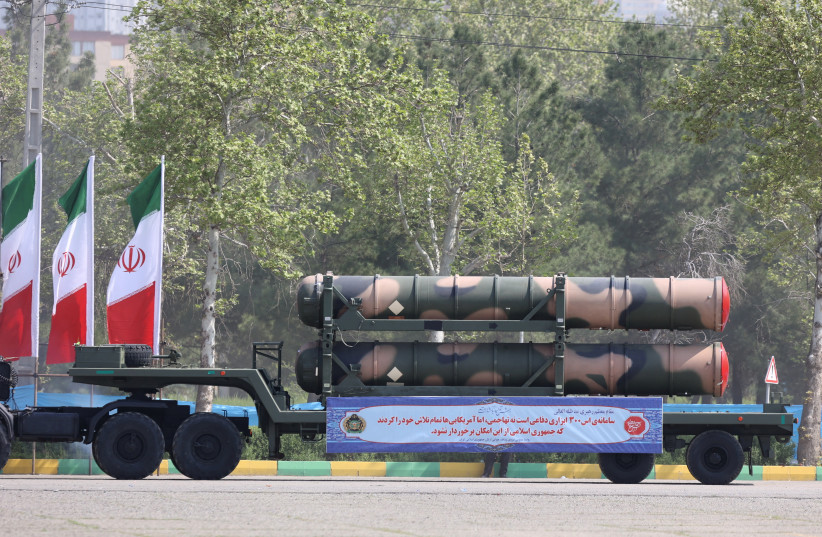Tehran helped plan Hamas’s October 7 massacre, Iran expert claims
The extent of Iranian involvement in Hamas’s decision to initiate the massacre on October 7 has not yet been fully disclosed – and according to various sources in the Arab media and the Iranian opposition, it is possible that the connection between the Revolutionary Guards and Hamas was even deeper and wider.
Dr. Hassan Hashemian, an Iran expert based in Washington, argued in an interview with the Saudi channel Al-Hadath, “I believe that everything that happened on October 7 was managed and planned during the era of Qasem Soleimani,” referring to the commander of the Quds Force of the Iranian Revolutionary Guards, who was killed in an operation attributed to the United States and Israel.
He added, “The issue of the tunnels and the funds invested in their construction, all the weapons accumulated by Hamas, and even the planning of the operation itself, were all conducted during Soleimani’s tenure. But the implementation itself was carried out by Ismail Qaani, Soleimani’s successor.”
“Qaani wanted to prove himself,” Hashemian continued, “because it is known that Soleimani is a different figure from him. Within Hamas, within the Quds Force, and even in the government offices in Tehran, and even among many agents abroad, it is believed that he does not measure up to the stature of Qasem Soleimani.”
According to Hashemian’s claim, official responses from Iran cannot be relied upon, stating that Tehran was not involved in Hamas’s planning.
Escalating tensions

Iran maintains vocal support for Hamas and the Palestinian cause, yet officially denies any involvement in attack planning. Nevertheless, doubts arise regarding the plausibility of such decisions being made without the Revolutionary Guards’ knowledge, particularly that of Qaani.
Iran’s supreme leader criticized Israel for the collapsed prisoner exchange deal, stressing the imperative of swift action against enemies. He underscored, “With the enemy, one cannot act with patience,” further stating, “Israel would not dare to commit the crimes it perpetrates against the Palestinians without the support it receives from the United States.”
On Sunday, former IDF Chief of Staff Prof. Yaakov Nagel read in a special article published in Maariv, “to move from words to actions” in Gaza and Lebanon given the escalation in tensions with Hamas. “When Israel finishes dealing with Hamas, the interests of Israel, Hezbollah, and Iran to postpone the fighting in the north will likely be caught for a short time,” he argued.
“It is imperative not to misjudge the challenges of confrontation with Iran. Israel must continue to act forcefully against Iran’s aggressive behavior and its desire to break into the nuclear field. Iran remains Israel’s central problem.”
“In light of the developments, from which Hamas’s priorities can clearly be understood,” he added, “Israeli priority must be to complete the mission in Gaza, strive for a temporary solution in the north that will allow residents to return home safely, and continue covert and overt activity against Iran to ensure it does not exploit the opportunity to break into the nuclear field and continue attacking Israel. Normalization with Saudi Arabia is very important but can wait.”
In a recent article published by Maariv, former IDF Chief of Staff Prof. Yaakov Nagel urged for a shift “from words to actions” in dealing with the escalating tensions in Gaza and Lebanon. He cautioned that after addressing the Hamas issue, there might be a brief moment where the interests of Israel, Hezbollah, and Iran align, emphasizing, “It is imperative not to misjudge the challenges of confrontation with Iran.”
Nagel stressed the need for Israel to maintain a robust stance against Iran’s aggressive behavior and its nuclear ambitions, stating, “Iran remains Israel’s central problem.” Addressing Hamas’s priorities, Nagel asserted, “Israeli priority must be to complete the mission in Gaza,” and advocated for pursuing a temporary solution in the north for residents’ safety.
He emphasized the importance of continuing covert and overt actions against Iran to prevent it from exploiting opportunities to advance its nuclear program and attack Israel. While acknowledging the significance of normalization with Saudi Arabia, Nagel suggested that it could be deferred, stating, “Normalization with Saudi Arabia is very important but can wait.”



Comments are closed.